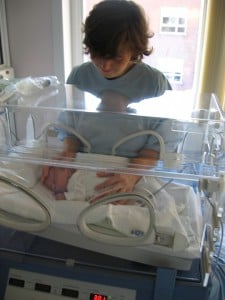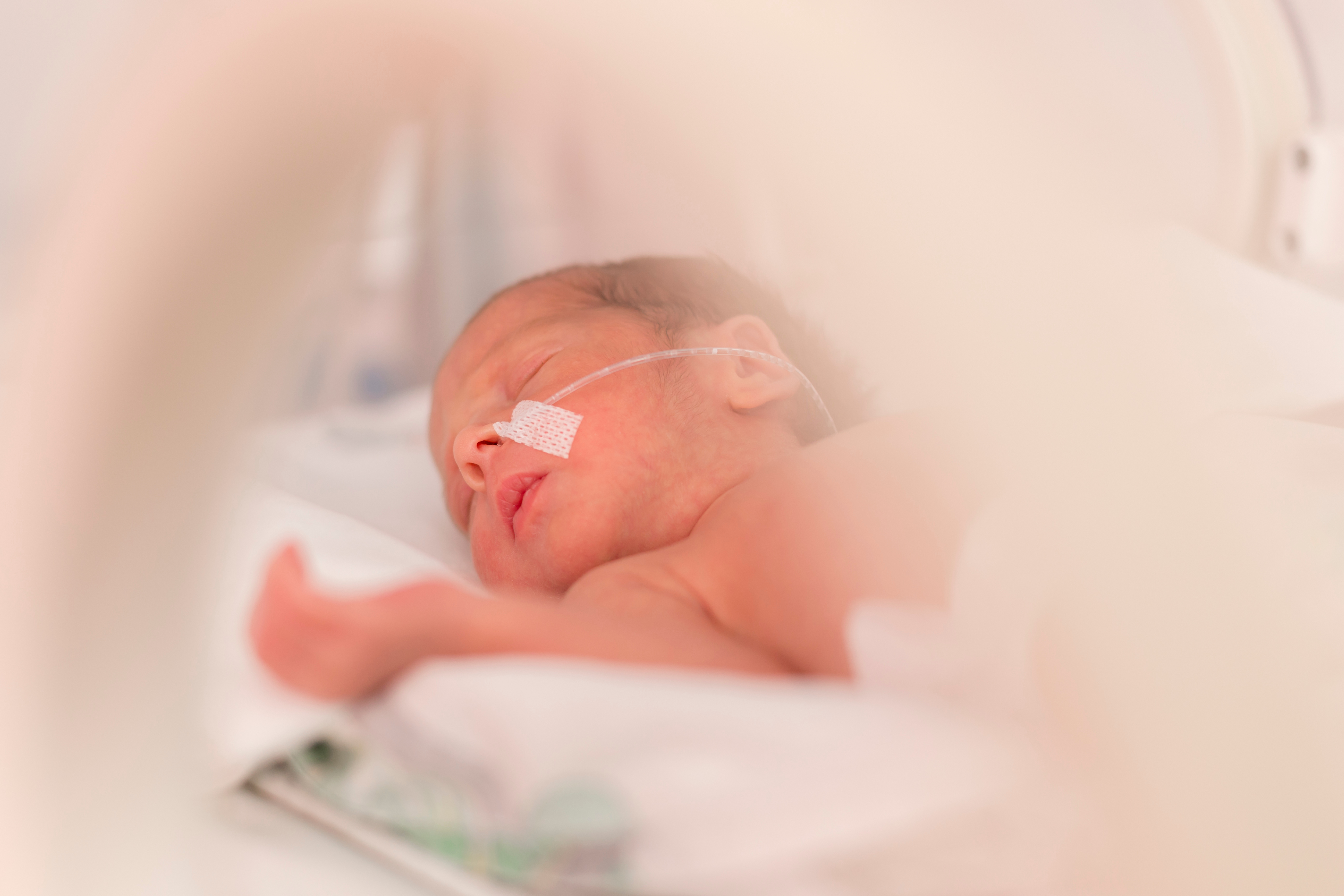Hello Parents,
Prematurity is a vast world. As I explained in the article What is Prematurity?, there are different levels of prematurity, different experiences felt by women, men and families. Attachment to the baby may take more time given the separation of the child from their parents.
In this article:
- Possible impacts of prematurity on the baby’s development
- Prematurity and breastfeeding
- Premature babies and development
An extremely premature baby is fragile and vulnerable to many complications given their system is very immature. Being born 12 weeks before term is no walk in the park. Over the 40 weeks of pregnancy, the baby’s functions will be perfected so that when they arrive, their development is as optimal as possible to deal with the outside world. Each vital system in the human body, each limb, each structure forms over time at a biological pace established by nature. We talk about days, weeks and months before becoming mature. A newborn still has immature systems, even if their external appearance seems complete.
In this article, I will try to explain how fragile and immature a premature baby’s systems are. It will help you better understand the situation. I would also like to talk about the impact of prematurity on breastfeeding, returning home and on the baby’s development over the coming years.
Possible Impacts of Prematurity on the Baby’s Development
At the respiratory level:
The baby’s respiratory function develops into the last weeks of pregnancy. In fact, the development of their pulmonary alveoli remains incomplete as long as the surfactant is not available to allow the alveoli to open and allow for gaseous exchanges to take place, essential for the baby’s survival.
Usually, after 34 weeks of pregnancy, babies face lower risks due to a lack of surfactant.
Before 34 weeks, the lack of surfactant can cause respiratory distress in a premature baby, which is called infant respiratory distress syndrome. This is why the mother can be given medication if she is showing signs of early labour, or even during labour, to compensate for the lack of surfactant and help open the premature baby’s alveoli.
You should not be surprised if a premature baby has pauses in breathing, called apnea in medical terms. These pauses often scare parents, as the clock slows down as they wait for the baby to breathe again. They have the impression that they are in full respiratory arrest. These pauses can easily last 10 seconds or more, which seems like an eternity standing beside the baby.
Monitors installed for premature babies in the neonatal unit also monitor respiratory rates. This technology also warns staff (via an alarm) if the baby’s breathing seems abnormal. Reassuring, right?
At the heart and blood level:
Since a premature baby’s brain is still in development, you should expect that their heartbeat will be irregular. There are heart decelerations (lowering of the heartbeat) that are often unexplained which require constant monitoring.
The immaturity of the central nervous system is the cause of this heartbeat disturbance. Time will allow this vital function to mature and stabilise.
Regarding a premature baby’s blood vessels, especially before 34 weeks, they are often more fragile and can burst easily, which is concerning when considering childbirth itself. Changes in pressure during labour and childbirth, as well as the pressure on the vascularisation during the birthing process, can lead to intracranial hemorrhages. This can be manifested in the days and weeks following childbirth. This is why the staff is always on the lookout for signs to act if necessary.
At the immune system level:
Once again, the baby’s immaturity means that their capacity to defend themselves against microorganisms is low and predisposes them to infections. Hygiene and asepsis are essential when caring for or being in contact with an extremely premature baby.
The most common infections are those associated with blood (septicemia), lungs (pneumonia), meningeal membranes (meningitis), and kidneys (often urinary infections).
Breast milk is the perfect food for premature babies, as it is both nutritious and full of antibodies provided to the baby from the mother. This is why caregivers will promote breastfeeding or pumping breast milk to give to the baby.
Vaccinations may also be required for very premature babies to help manufacture antibodies for protection. Subsequently, the vaccine calendar will be followed based on the baby’s chronological age. At two months of age, they will have vaccines, then a four and so on, irrespective of whether they were born earlier.
Des vaccins peuvent être suggérés pour les grands prématurés pour aider à la fabrication d’anticorps afin de mieux se protéger. Par la suite, le calendrier vaccinal sera suivi avec l’âge chronologique du bébé. À 2 mois de vie, il aura des vaccins puis à 4 mois et ainsi de suite, peu importe qu’il soit né avant ou pas.
At the blood component level:
 When a baby is born, naturally the umbilical cord is cut. The cord allowed them to receive nutrients and oxygen and eliminate waste.
When a baby is born, naturally the umbilical cord is cut. The cord allowed them to receive nutrients and oxygen and eliminate waste.
After childbirth, the baby has to get its nutrients from its digestive system. They need to feed rapidly after birth to maintain their blood parameters stable.
It’s not surprising to see a drastic lowering of their blood glucose (blood sugars) a few minutes after the birth of a premature baby. Often, a very premature baby can’t breastfeed or take a bottle as they lack the coordination to suck, breathe and swallow.
This process seems simple but is in fact very complicated. It requires more maturity, strength and energy and that premature baby just doesn’t have. The staff will feed the baby to try and maintain their blood components which are necessary for their growth. Iron, calcium, phosphorus and other types of supplements can be prescribed by the doctor, as these reserves are typically built up by the baby during the last trimester of pregnancy.
At the digestive system level (stomach and intestines):
For a premature baby’s stomach, you can expect typical gastro-esophageal reflux symptoms given that the muscle at the entry to the stomach is far from being mature.
Measures will be taken after childbirth to ensure they are as comfortable as possible with their reflux: position, quantity and type of milk, and medication if needed.
The baby will have to live with sensitive intestines which are very immature. A premature baby’s intestinal microbiota is very different from a term baby. Their immune, digestive and elimination function is very much diminished.
The intestine will have difficulty absorbing nutrients. It may strongly react to agents found on the walls (bacteria or other). It will be more difficult for the organism to eliminate via stool as well.
The severe intestine complication to monitor for in the neonatal unit is a diagnosis of newborn necrotising enterocolitis. This is an inflammation of the internal intestinal mucous in the intestine which can lead to lesions or perforation. This can cause vomiting, diarrhea and severe bleeding.
The liver:
A premature baby’s liver is immature, and it can’t do the work expected of it.
When a baby is born, even at term, there is massive destruction of red blood cells, as there are too many in their blood compared to their size. The breakdown of these cells releases a yellow pigment call bilirubin.
A newborn’s liver can’t metabolise, transform this pigment easily, and it will accumulate in the baby’s blood. This normal post-childbirth adjustment process is called newborn physiologic jaundice.
The intensity will vary from one baby to another. The bilirubin residues will often be eliminated in stool and the baby’s skin, which makes it seem yellowish in colour. This is jaundice.
 Jaundice can become pathological when the bilirubin level in the blood reaches an overly high threshold. The pigment can then cross through the cerebral barrier and lead to severe neurological damage for the baby. This is why all babies are tested in the days following childbirth.
Jaundice can become pathological when the bilirubin level in the blood reaches an overly high threshold. The pigment can then cross through the cerebral barrier and lead to severe neurological damage for the baby. This is why all babies are tested in the days following childbirth.
If the measurement is too high, the baby will be kept in the hospital for phototherapy (light lamps) to quickly reduce the level of blood bilirubin, eliminating via their skin assisted by light.
For a premature baby, they often have more phototherapy than term babies. A light may be installed above and below them to increase the bilirubin breakdown and elimination process and prevent possible complications.
Body temperature regulation:
Once again, a premature baby’s neurological condition means that their body temperature will be unstable. They are used to being at a specific temperature in the mother’s uterus, which kept it warm. After childbirth, staff will try to keep them warm to promote growth and avoid babies having to use up their energy resources to try to keep themselves warm.
Incubators in neonatal wards maintain heat and humidity levels stable for the baby until they no longer need assistance.
Additionally, premature babies are often born very skinny, lacking fatty subcutaneous tissues. These usually accumulate over the last weeks of pregnancy.
I hope these explanations have helped you understand a premature baby’s vital functions. Now, how can a baby be fed if they are born, say, at 28 weeks?
To continue reading, go to Prematurity and Breastfeeding.


